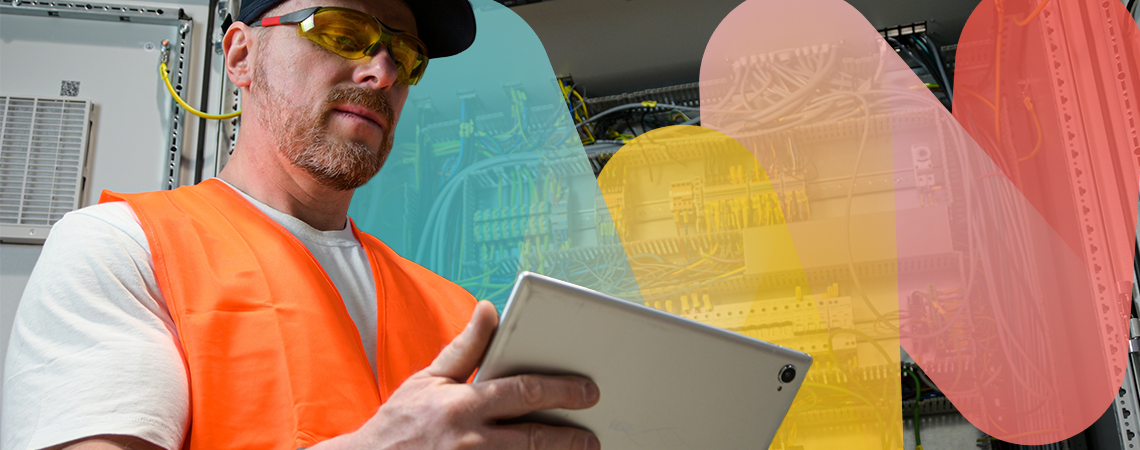
Compliance: the foundation or the downfall of electrical contractors?
How to protect yourself from costly mistakes (and maybe even turn compliance into an opportunity)
Compliance is the constant that every electrical contractor works under. The real question is whether it slows you down or sets you apart.
Some firms let compliance hold them back, with teams chasing job sheets and filling out endless admin. Others use compliance as a strength. They treat it as proof of professionalism, a way to speed up invoicing, reduce disputes, and earn client trust.
The Chartered Institute of Building (CIOB) has warned that late payments continue to squeeze SMEs across construction, and poor documentation is often part of the problem. Weak records don’t just delay cash flow, they put businesses at risk of losing clients altogether.
On the flip side, firms that embrace digital systems see dramatic results:
“Since going live with Joblogic, Target Lifts has achieved stronger contract performance, tighter compliance control, and a more unified approach to service delivery.”
The business value of strong documentation
The scale of the UK’s energy transition cannot be overstated. National Grid ESO projects that electricity demand will rise by 65% by 2035, driven by the electrification of transport, heating, and industry. Meeting this surge will require more than 5,500 km of new transmission lines, and a near tripling of renewable generation capacity.
This transformation will also demand smarter systems. Ofgem has stressed the importance of smart charging and grid flexibility to manage millions of new EVs without overwhelming supply. Globally, the International Energy Agency’s Global EV Outlook 2024 shows EV adoption accelerating faster than predicted, confirming that the UK’s targets are part of a worldwide shift, rather than a local experiment.
Progress is already visible. London successfully hit its goal of 300 rapid EV charging points before 2021, showing that large-scale deployment can be achieved when policy and industry align.
For contractors, these changes mean more than statistics. They signal a wave of projects, from domestic installations, to commercial hubs, fleet depots, and renewable integrations, all requiring skilled hands to deliver.
Why modern methods beat paper every time
For a long time, paper records were the only option. But having a paper-based business presents numerous challenges - job sheets get lost, certificates go missing, and handwriting is unclear. By the time paperwork makes it back to the office, details are forgotten and information is incomplete.
The Electrical Contractors’ Association emphasises that compliance is more than a legal obligation. It is a professional standard that shows clients your business takes accountability seriously. Paper makes it harder to live up to that standard, while digital systems build it into your daily process.
And the results? RDA Service & Installation cut job times by 50% after moving away from paper. These gains show what is possible when businesses stop relying on outdated methods.
What good looks like with digitised compliance
Going digital is not just about quitting paper. It is about building a system where compliance becomes second nature across your business. The best digital setups have a few things in common:
- Mobile forms capture every step. Engineers complete standardised forms on site so no details are missed and every job record looks professional.
- Certificates are generated automatically. EICRs, Gas Safe records and other compliance documents are created as PDFs instantly, ready to share with clients or auditors.
- Proof is built in. Photos and signatures are timestamped and stored securely, creating a clear trail of accountability.
- Records are always ready. Whether it is an audit, a client request or an internal review, information is available at the click of a button.
The results
Case study: Barlows UK Ltd
A clear example of digital compliance in practice comes from Barlows UK Ltd, a nationwide electrical contracting firm with more than 400 engineers. At this scale, paper-based systems were simply not compatible with managing the organisation.
With Joblogic, Barlows transformed compliance management. Job records, certificates, and audit trails are created in real time, giving managers complete visibility of their workforce. Automated reporting has cut admin, while secure cloud storage ensures every certificate and signature is available when inspections take place.
The results are clear. Engineers spend less time on paperwork and more time on site. Managers have accurate information at their fingertips. Clients receive compliance documents faster, which builds trust and strengthens relationships.
“Joblogic has helped take our business to the next level, improving our efficiency both on-site and in our offices.”
The Barlows case shows that digitised compliance goes beyond removing admin headaches. It builds a platform for efficiency, transparency, and sustainable growth.
Turning compliance into profit
Compliance will always be part of electrical contracting, but how you manage it decides whether it becomes your foundation or your downfall. Paperwork slows teams down, creates gaps, and puts cash flow at risk. Digitised compliance builds the opposite: consistency, trust, and a reputation that wins repeat work.
The businesses that treat documentation as more than admin see the rewards. They get paid faster, spend less time on disputes, and walk into audits with nothing to hide. Clients notice too; professional, accurate records show that your business is organised and accountable, qualities that turn first-time jobs into long-term contracts. Contractors using Joblogic report delivering 90% client satisfaction, a direct result of stronger compliance and smoother service delivery.
Book a 15-minute demo today and see how Joblogic ensures compliance is your foundation for profit, not your downfall.


.png)